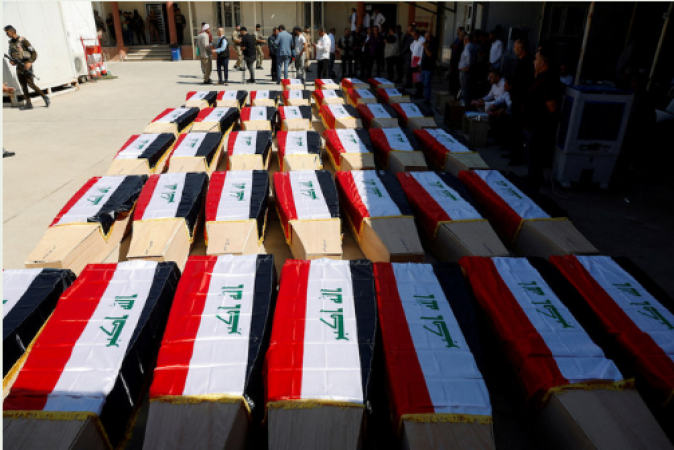
Irbil: On August 3, 2014, just after midnight, heavily armed Daesh extremists stormed into the Sinjar region of northern Iraq, the homeland of the Yazidi people, rounding up the civilian populace for execution or captivity.
The Yazidi community, one of Iraq's oldest ethnoreligious minorities, was specifically targeted by Daesh because it was seen as an apostate group due to its religious practises. Even now, nine years later, the survivors are still processing what happened.
Barzan H., 23, told Arab News in Irbil, the capital of Iraq's semi-autonomous Kurdistan region, where he now lives alongside thousands of other displaced Yazidis, "I remember my parents frantically waking me and my siblings up at around 2 a.m.
Also Read: Japan to Host Iran's Foreign Minister, Urges Halt to Weapon Supplies to Russia
"I peered out the windows and saw a queue of black jeeps and trucks coming in. In order to defend us, the older and more capable men took up arms, using the rifles they had at home and whatever else they could find.
When Daesh attacked Barzan's hometown, he was only 14 years old. He and his neighbours grabbed what they could carry and fled their homes as the extremists moved closer. About 400,000 people were relocated. Few would come back.
"I remember hiding until 8 a.m. in the mountains. It was warm. Due to the fear and running, we were physically parched and exhausted, according to Barzan.
He continued, "They were on to us. They loaded us into their trucks and drove us to a vacant building. They separated us male minors from the women and female children.
Captured individuals were brought to a school building, where wives, children, and brothers were divided from captured individuals. Men and senior citizens who refused to convert to Islam were executed.
A rough estimate of 7,000 women and children were put on trucks and forcibly moved to Syria and other regions of Iraq, where many were trafficked into domestic servitude or sexual slavery.
Boys and younger men were kidnapped and forced to join the militants in battle as "cubs of the caliphate," after receiving training and brainwashing.
"My friends and I were taken to Tel Afar, and then to Mosul," recalled Barzan. They instructed us to abandon our previous religion, become Muslims, and begin training for the military.
He received his training in Deir Ezzor, Syria, before being sent to the front lines in Mosul, Iraq, the scene of some of the fiercest fighting later between Iraqi and coalition forces.
According to Barzan, some of his friends were susceptible to Daesh's brainwashing and became suicide bombers.
"I witnessed Daesh soldiers raping prepubescent girls and executing sons in front of their mothers," the author said.
Also Read: Trump enters a not guilty plea to allegations that he attempted to rig the election
The militants were gradually driven back to their final stronghold of Baghouz in Deir Ezzor as Daesh's so-called caliphate started to fall. Early in 2019, as the Syrian Democratic Forces and their allies drew near, Barzan's father made contact with a smuggler to arrange for his son's rescue.
Barzan was able to leave his regiment and flee from Baghouz despite being heavily bombarded. He crossed no man's land and got to safety in five days.
The fate of his sister and two brothers is still unknown, despite the fact that he was eventually reunited with his living family. His family has not gone back to Sinjar like thousands of others have.
Barzan declared, "There is nothing to return to. "They (Daesh) tore down Sinjar. Too many deaths and bloodshed.
The Yazidi Survivors' Bill, which required reparations and material compensation for Yazidis and other minority groups who had been persecuted by Daesh, was approved by Iraq's then-president Barham Salih in March 2021. The Iraqi government also declared that it would contribute to the reconstruction of Sinjar.
The majority of the Yazidis are still displaced throughout the Kurdistan region, mostly centred in temporary camps around the city of Duhok, and the promised reconstruction has not yet been properly implemented.
According to Barzan, "the Muslim community had their homes rebuilt." "Our village is still in ruins, and we are sick of pounding on doors of organisations without receiving payment. There isn't much concern from the Iraqi government for us.
The Yazidi women and girls experienced the worst abuse at the hands of Daesh, with many of them being sold into prostitution and made to carry their captors' offspring.
"I had just turned 15 years old. That evening practically plays as a movie in my head. Siham Suleiman Hussein, a 23-year-old Yazidi who now resides in the Khanke Camp close to Duhok, said of Daesh's arrival in Sinjar, "Some parts I wish to forget.
Also Read: Rights Groups Rally for Unbiased Probe into Greek Migrant Ship Incident
"The militants discovered us in the mountains, hiding. We were loaded into their trucks, and they drove us into Iraq. They kept us at the wedding venue Galaxy Hall. Mothers were separated from the younger girls. Senior women were dispatched to Mosul.
Hussein was put up for auction there. The first person who bought her was a Tunisian Daesh fighter who "thankfully died a few days after my purchase," she claimed. The couple of days I had with him were terrible.
Later, a militant from Libya bought her